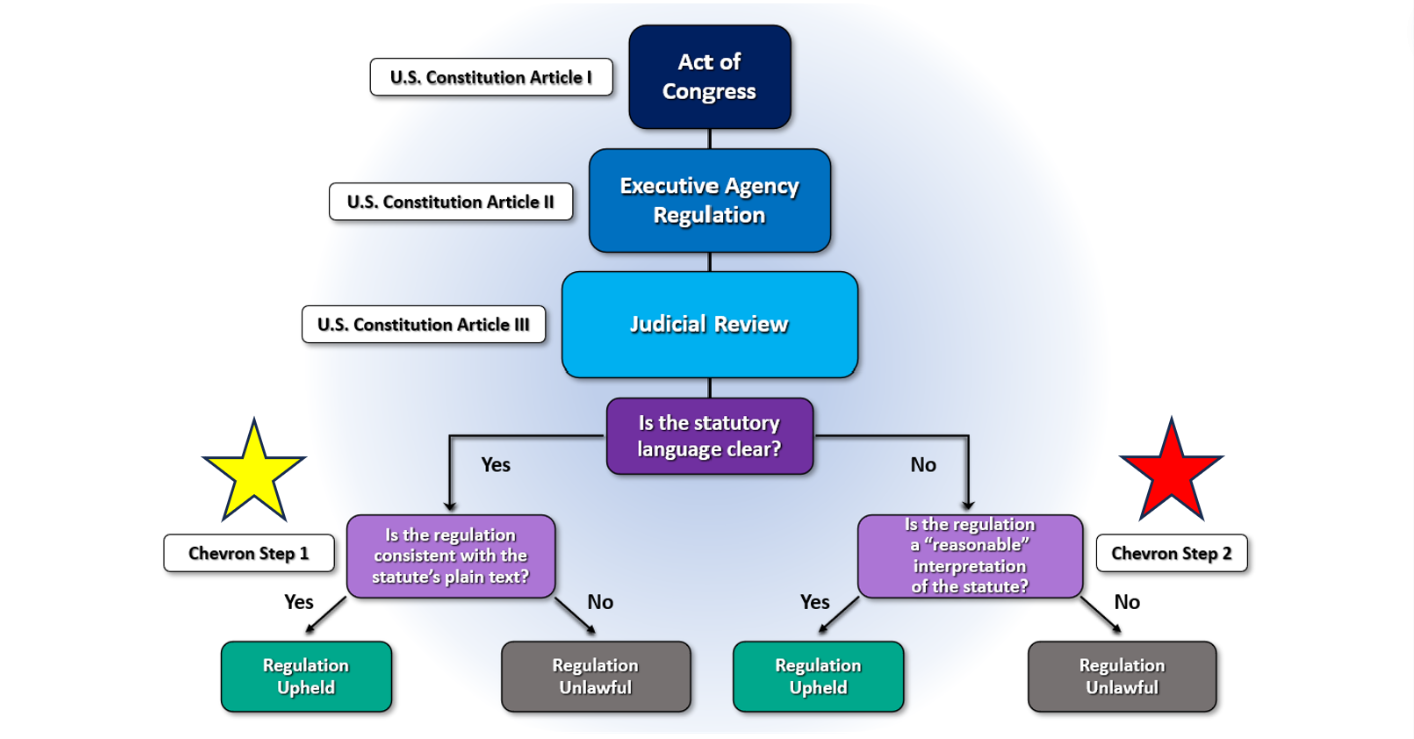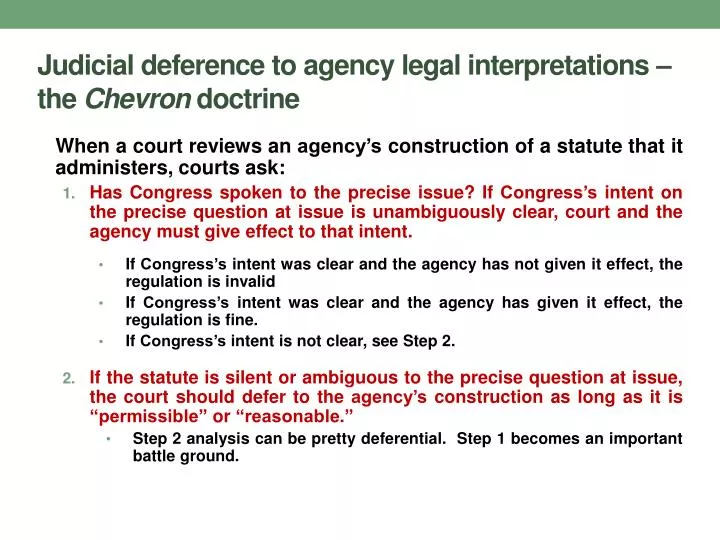Legal Significance of Chevron Ruling: Chevron Ruling Explained

Chevron ruling explained – The Chevron ruling, issued by the Supreme Court of the United States in 1984, has had a profound impact on the way courts review agency interpretations of law. The ruling established a two-step test that courts must apply when reviewing such interpretations. First, the court must determine whether Congress has spoken to the precise question at issue. If Congress has not spoken to the issue, then the court must defer to the agency’s interpretation if it is reasonable.
Chevron deference is a legal doctrine that requires courts to defer to an agency’s interpretation of a statute when that interpretation is reasonable. This doctrine was established by the Supreme Court in the case of Chevron U.S.A., Inc. v. Natural Resources Defense Council, Inc.
(1984). In grants pass supreme court , the Court applied the Chevron deference doctrine to uphold an agency’s interpretation of a statute that regulated the use of off-road vehicles on public lands. The Court held that the agency’s interpretation was reasonable and that it was entitled to deference.
Chevron Deference, Chevron ruling explained
The Chevron ruling has been applied in numerous cases since its issuance. In one case, the Supreme Court held that the Environmental Protection Agency’s interpretation of the Clean Air Act was entitled to deference. In another case, the Court held that the National Labor Relations Board’s interpretation of the National Labor Relations Act was not entitled to deference because Congress had spoken to the precise issue at issue.
Chevron ruling explained the principle of judicial deference to agency interpretations of ambiguous statutes. However, in a recent landmark ruling, the Supreme Court overturned chevron deference. This means that courts will now be more likely to review agency interpretations and determine whether they are reasonable.
This shift has significant implications for the balance of power between agencies and the courts, and will likely lead to increased judicial scrutiny of agency actions.
Practical Implications of Chevron Ruling

The Chevron ruling has had a significant impact on the relationship between businesses, government agencies, and the judiciary. It has created a framework for judicial review of agency decisions that balances the need for deference to agency expertise with the need for judicial oversight. This framework has had both benefits and drawbacks, and its effects have been felt in a wide range of sectors.
Benefits of Chevron Ruling
One of the main benefits of the Chevron ruling is that it provides businesses with greater certainty regarding the legal standards that will be applied to their activities. This certainty allows businesses to make more informed decisions about how to comply with the law and avoid potential penalties. Additionally, the Chevron ruling has helped to reduce the number of lawsuits challenging agency decisions, which has saved businesses time and money.
Drawbacks of Chevron Ruling
While the Chevron ruling has had some positive effects, it has also been criticized for giving too much deference to agency expertise. Critics argue that this deference has allowed agencies to avoid accountability for their decisions and has made it more difficult for courts to overturn agency actions that are arbitrary or capricious. Additionally, the Chevron ruling has been criticized for creating a “two-tiered” system of judicial review, in which agencies are given more deference than other government entities.
Examples of Chevron Ruling Effects
The Chevron ruling has affected decision-making in a wide range of sectors, including environmental regulation, healthcare, and financial regulation. In the environmental context, the Chevron ruling has been used to uphold agency decisions regarding the regulation of air pollution, water pollution, and endangered species. In the healthcare context, the Chevron ruling has been used to uphold agency decisions regarding the approval of new drugs and medical devices. In the financial regulation context, the Chevron ruling has been used to uphold agency decisions regarding the regulation of banks and other financial institutions.
Critique and Analysis of Chevron Ruling

The Chevron ruling, which grants significant deference to agency interpretations of ambiguous statutes, has been a subject of debate and criticism since its inception. Critics argue that the ruling gives too much power to agencies, allowing them to overstep their authority and undermine the intent of Congress.
Opponents of Chevron argue that it allows agencies to make policy decisions that should be left to elected officials. They also contend that the ruling has led to inconsistent and arbitrary interpretations of the law, as different agencies may interpret the same statute in different ways.
Arguments for Overturning or Modifying Chevron
- Undermines the Separation of Powers: Critics argue that Chevron gives too much power to the executive branch, allowing agencies to essentially make laws without the input of Congress or the courts.
- Leads to Inconsistent and Arbitrary Interpretations: Opponents contend that Chevron has led to different agencies interpreting the same statute in different ways, creating uncertainty and confusion in the law.
- Undermines Congressional Intent: Critics argue that Chevron allows agencies to disregard the intent of Congress when interpreting statutes, leading to outcomes that Congress did not intend.
Arguments for Maintaining Chevron
- Promotes Agency Expertise: Supporters of Chevron argue that it allows agencies to use their specialized knowledge and expertise to interpret complex statutes.
- Provides Consistency and Predictability: Chevron ensures that agencies’ interpretations of statutes are consistent and predictable, which is important for businesses and individuals who rely on the law.
- Protects Agencies from Judicial Overreach: Supporters contend that Chevron prevents courts from micromanaging agencies and interfering with their ability to carry out their duties.
Potential Reforms or Alternatives to Chevron
There have been several proposals to reform or replace the Chevron ruling, including:
- Narrowing the Scope of Chevron: One proposal is to narrow the scope of Chevron, limiting its application to cases where the statute is truly ambiguous.
- Creating a New Standard of Review: Another proposal is to create a new standard of review for agency interpretations, one that is more deferential than Chevron but less deferential than the current arbitrary and capricious standard.
- Abolishing Chevron: Some critics argue that Chevron should be abolished altogether, allowing courts to give less deference to agency interpretations of statutes.
Chevron ruling explained, a doctrine that defers to agency interpretations of ambiguous statutes, was recently overturned in the Chevron vs NRDC case. chevron vs nrdc overturned This decision has significant implications for the role of courts in interpreting statutes and the deference given to agency interpretations.
However, the Chevron ruling explained remains an important precedent in administrative law, providing guidance on how courts should review agency actions.
The Chevron ruling explained the Supreme Court’s deference to agency interpretations of ambiguous statutes. This principle has been applied in various cases, including grants pass supreme court. The Chevron ruling provides a framework for courts to evaluate agency interpretations and ensures that agencies have the necessary flexibility to implement complex statutes.
The Chevron Ruling explained how courts should interpret statutes that are ambiguous and how agencies should interpret statutes that are within their delegation of authority. The Chevron Ruling has been applied in numerous cases, including Chevron vs NRDC. The Chevron Ruling explained that courts should defer to an agency’s interpretation of a statute if that interpretation is reasonable.
This deference is given because agencies have expertise in the area of law that they are interpreting.